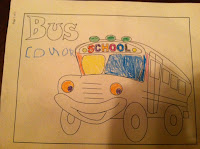- There is something a bit terrifying about putting your kid on the school bus. For one, there are lots of moving bodies not wearing seat belts. That seems counter to the messages we give our children each time we carefully buckle them into the car. Second, that's a lot of kids in one place unobserved by an adult who can pay attention-- the one adult is driving. I haven't seen any patrols on these buses- I used to be a patrol (!), are these now a thing of the past? Third, it's not clear what happens on the other end. Our little boy has to get off the bus and find his way to his classroom, 2 floors and several hallways away. We were told he'd be escorted, and yet he came home the second day and said that no one was there, and he simply went classroom to classroom saying "Hi, I'm Conor and I'm supposed to be in Mrs. X's kindergarten." Huh?
- There are fancy ways to talk about discipline but they send mixed messages. Our school uses different colored pieces of paper to let parents know what kind of day the kid had. Green is good, yellow is ok, and red is bad. In a 4 day week we got 1 green piece of paper, and three days he came home with nothing, annoyed that he had been good but not gotten a green. Is his meant to work towards a green, or away from a red? Or not care, and just do his thing? We're not sure, but we're hearing a lot about it.
- The sociologist in me is noticing where Bowles and Gintis were right. Tonight Conor shared a set of pictures he made. He reported that after completing one, his teacher said "Is that the best you can do?" She then gave him another sheet, and he completed the second. Which one do you think made her happiest? Which one did he like best?
While unfortunately I have managed to include my shadow in both pictures (argh!), I'm betting
you know the answer-- my son was told it is preferable to color within the lines. That's a first for
him, previously educated in a Waldorf school. And I'm just not sure how I feel about it. What I
know is that my son said he preferred the blue picture, and that he didn't like being told it wasn't
good enough.
know is that my son said he preferred the blue picture, and that he didn't like being told it wasn't
good enough.
Anyway, it's a new beginning, and we're just getting our feet wet. Rest assured, we don't pretend for a moment that this tells us anything about the quality of his teacher or the school. We haven't raised any objections, and have no plans to. But this is, as expected, a fascinating experience.
You have read this article kindergarten /
public education
with the title kindergarten. You can bookmark this page URL http://apt3e.blogspot.com/2012/09/public-school-observations-part-1.html. Thanks!

